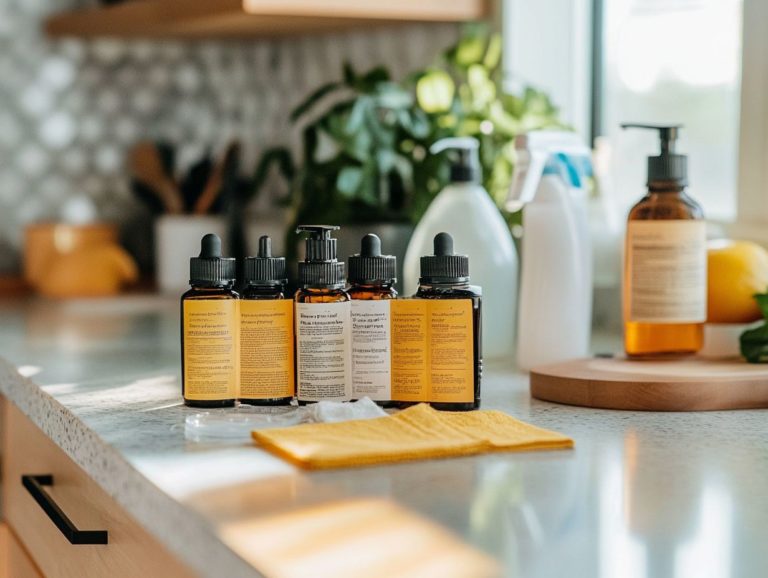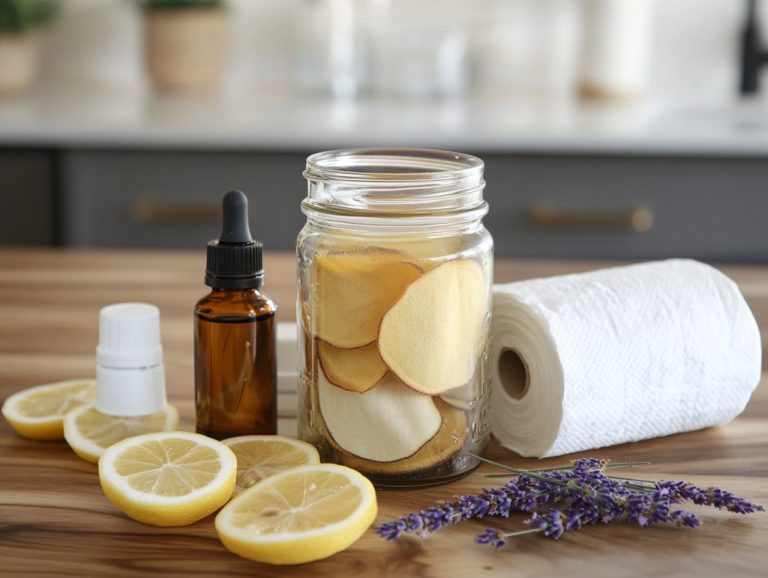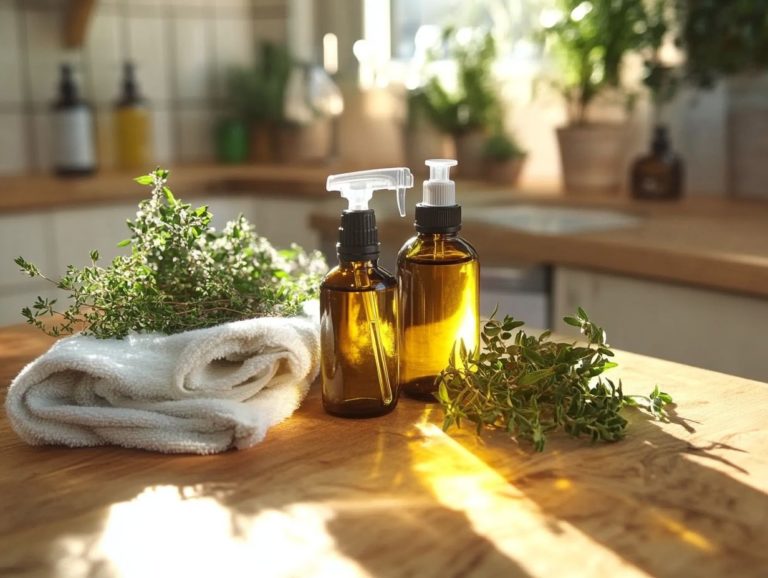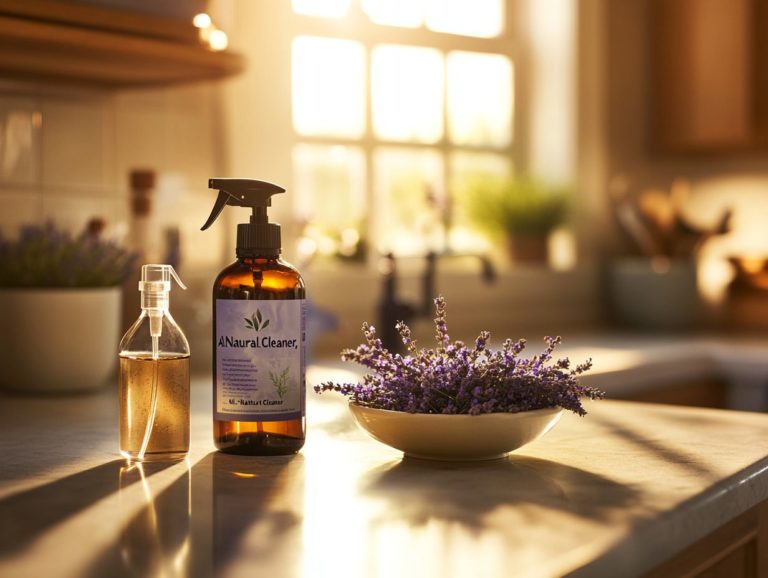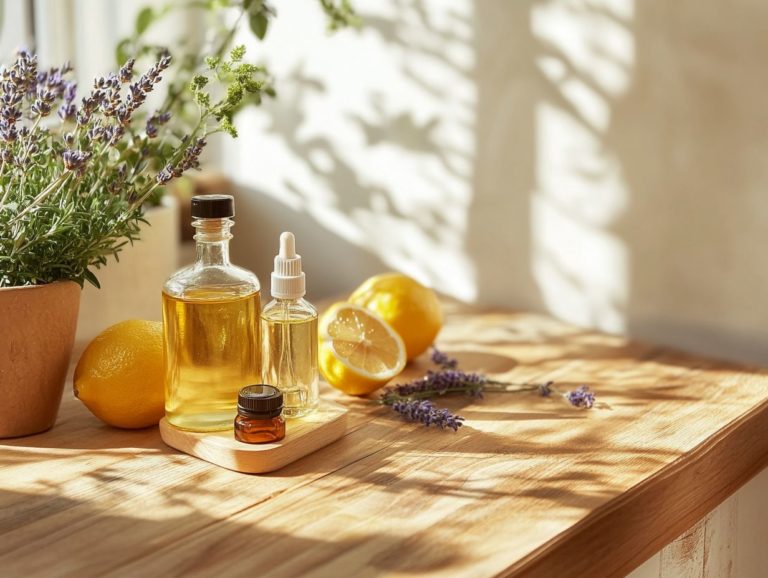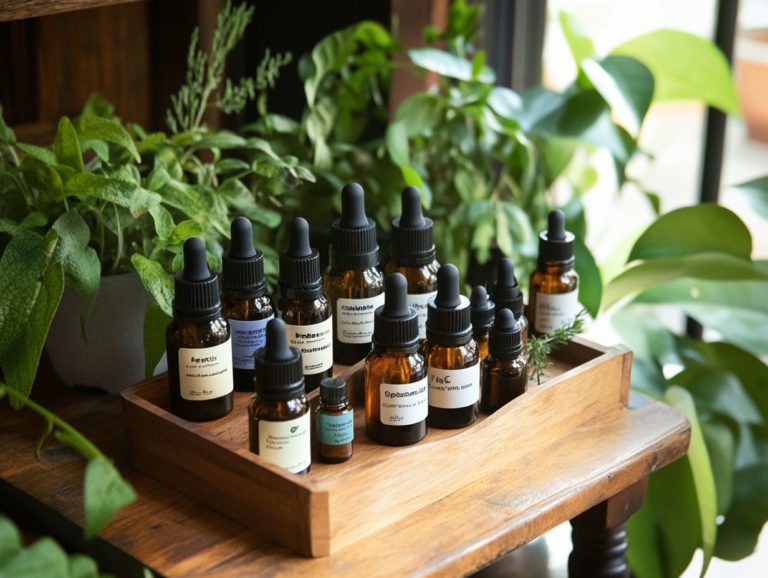Essential Oils and Their Role in Green Cleaning
Essential oils have emerged as a sophisticated choice for those in search of natural alternatives to conventional cleaning products.
These aromatic extracts are brimming with powerful properties. They not only invigorate your living space but also provide many benefits for both cleaning and wellness. This article delves into the essence of essential oils, detailing how they are extracted and highlighting their remarkable antimicrobial properties.
You ll also find insights into the best essential oils for cleaning, along with effective DIY recipes that elevate your cleaning routine. Essential safety tips will ensure a secure experience for both you and your pets.
Embrace the world of essential oils and transform your home into a healthier, greener sanctuary!
Contents
- Key Takeaways:
- What Are Essential Oils?
- How Are Essential Oils Extracted?
- What Are the Benefits of Using Essential Oils for Cleaning?
- Which Essential Oils Are Best for Cleaning?
- How to Use Essential Oils for Green Cleaning?
- Are There Any Safety Concerns When Using Essential Oils for Cleaning?
- Frequently Asked Questions
- What are essential oils, and why are they great for green cleaning?
- Which essential oils are commonly used in green cleaning?
- How do essential oils help in making cleaning products eco-friendly?
- Do essential oils have any antibacterial properties?
- Can essential oils be used to remove stains?
- Are there any precautions to take when using essential oils for green cleaning?
Key Takeaways:
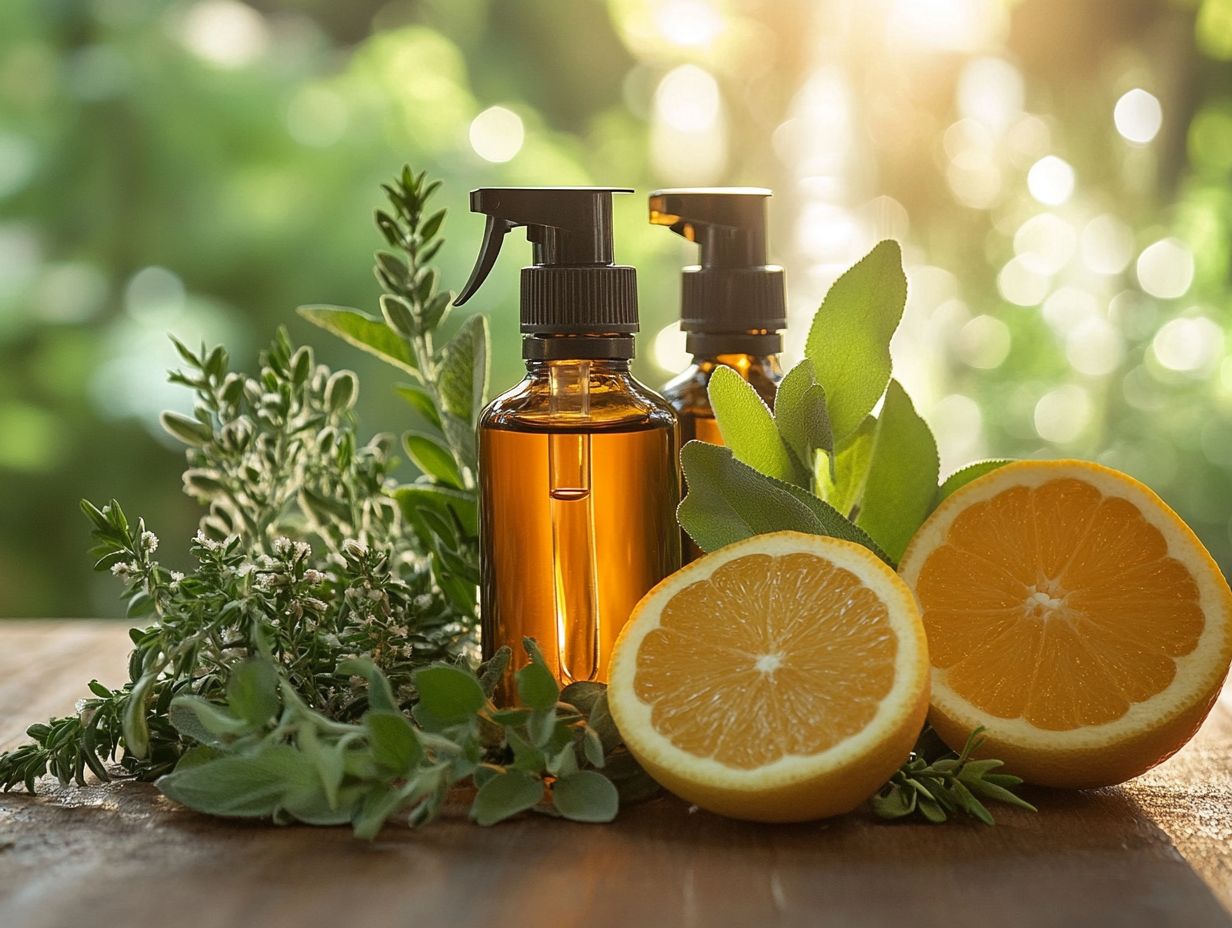
- Essential oils possess natural antimicrobial properties, making them highly effective for cleaning and disinfecting.
- Certain essential oils, like eucalyptus and tea tree, can help alleviate allergy symptoms and provide a pleasant scent while cleaning.
- Using essential oils in DIY cleaning recipes, alongside other green cleaning products, offers a safe and eco-friendly way to keep your home clean.
What Are Essential Oils?
Essential oils are concentrated plant extracts obtained from various parts of plants, such as flowers, leaves, and roots. They are primarily extracted through methods like vaporizing plant material with steam and pressing the rinds of citrus fruits.
These powerful compounds have become integral to daily life, enhancing everything from cleaning routines to aromatherapy and personal care. Their myriad benefits and delightful fragrances captivate many essential oil enthusiasts.
Explore this aromatic world and discover the wonders of nature with the remarkable oils available from reputable brands that prioritize purity and organic sourcing.
How Are Essential Oils Extracted?
Essential oils are extracted using various methods, with steam vaporization and mechanical pressing being the most common. These techniques preserve the natural properties and concentrated essence of the oils.
In steam vaporization, steam is used to extract oils from plant materials. Mechanical pressing is mainly used for citrus fruits, where the rind is pressed to release the oil.
Understanding these extraction methods is crucial, as they ensure the potent qualities of essential oils remain intact, making them ideal for both cleaning and therapeutic applications.
What Are the Benefits of Using Essential Oils for Cleaning?
Using essential oils for cleaning offers numerous benefits, establishing them as a popular choice among people who care about the environment and prefer natural cleaning options. These natural cleaning agents possess strong antibacterial and antiviral properties, effectively eliminating germs and bacteria from various surfaces. This makes them a safer and more sustainable alternative to traditional household cleaners.
The delightful aroma of essential oil blends elevates your cleaning experience, filling your home with a fresh and inviting scent while promoting a natural approach to hygiene.
Try integrating essential oils into your cleaning routine today and feel the difference!
Unlock the Germ-Fighting Power of Essential Oils!
Essential oils are celebrated for their remarkable properties that fight germs, including both antibacterial and antiviral effects. This makes them exceptional natural disinfectants for your home cleaning needs.
Various studies highlight that essential oils like tea tree oil, lavender, and eucalyptus can inhibit the growth of harmful bacteria and viruses. They provide a powerful yet non-toxic option for maintaining hygiene in your living space.
Recent research shows that tea tree oil can significantly reduce the presence of Staphylococcus aureus, a common household pathogen. Lavender oil enchants with its calming aroma while effectively combating respiratory viruses. Meanwhile, eucalyptus oil, rich in cineole, freshens the air and serves as a formidable agent against various strains of bacteria and fungi.
Incorporating these essential oils into your DIY cleaning recipes is easy! Simply mix them with water, vinegar, or baking soda to create effective natural cleaners. Not only will they enhance the cleanliness of your home, but they’ll also fill your space with delightful fragrances.
Can Essential Oils Help with Allergies?
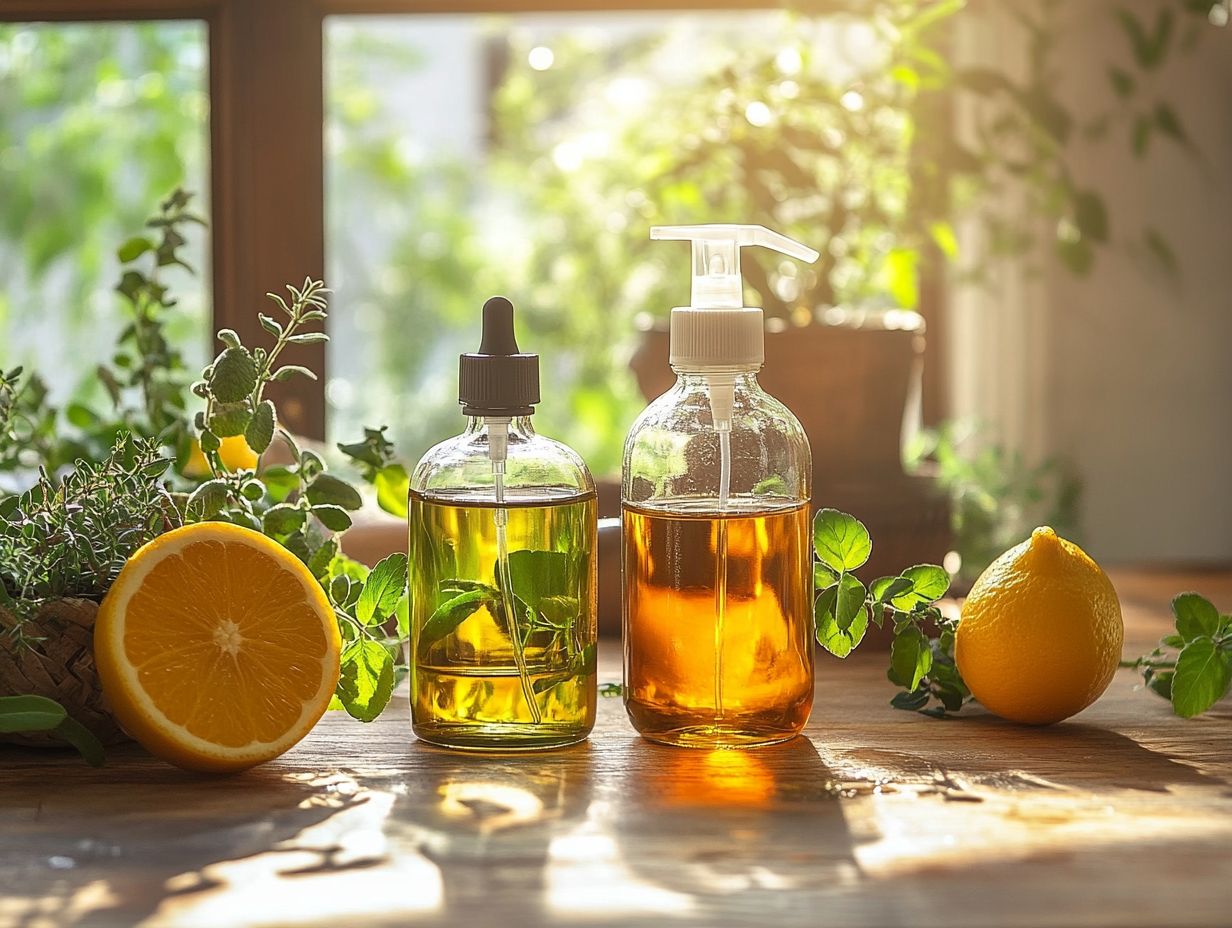
Essential oils might be the natural remedy you ve been looking for to ease allergy symptoms. They offer a refreshing alternative to conventional medications. Oils like lavender and peppermint are celebrated for their calming effects and can help reduce congestion and inflammation.
However, it’s important to keep your personal health needs in mind. Be aware of any potential allergic reactions when using these oils. Among the many beneficial oils, eucalyptus stands out with its invigorating scent that can help clear airways. Tea tree oil, known for its powerful antimicrobial properties, is a strong ally against allergens.
Don t miss the chance to diffuse these oils for an instant boost! You can also mix them with a carrier oil a neutral oil used to dilute essential oils for safe application on the skin or even inhale them directly from the bottle for a quick pick-me-up.
Experimenting with blends can amplify their benefits. For instance, try combining lavender, peppermint, and eucalyptus to target multiple symptoms at once. Just remember to consult with a healthcare professional to ensure that the oils you choose won t trigger any unwanted reactions, especially if you have sensitive skin or pre-existing health conditions.
Experience the Pleasing Scents of Essential Oils!
Essential oils are a treasure trove of delightful and varied scents. They play a vital role in the world of aromatherapy. Each essential oil, from the invigorating aroma of lemon to the soothing scent of lavender, offers a unique olfactory experience that can elevate your mood, promote relaxation, and transform any space into a sanctuary.
These oils not only contribute to your wellness through their captivating fragrances but also enhance your cleaning routine. They leave your surroundings not just spotless, but also wonderfully aromatic. For example, tea tree oil brings antiseptic properties to your cleaning arsenal, while eucalyptus invigorates your senses and promotes clarity.
When it comes to blending, consider pairing bright citrus oils like grapefruit with floral notes such as bergamot to create a refreshing yet calming ambiance. Alternatively, combine stimulating peppermint with earthy cedarwood to sharpen your focus, crafting an effective backdrop for a harmonious home atmosphere.
Which Essential Oils Are Best for Cleaning?
In your cleaning endeavors, certain essential oils stand out for their remarkable properties. They are the ideal choices to elevate your cleaning routine.
Essential oils like tea tree oil, lemon essential oil, lavender essential oil, eucalyptus essential oil, and peppermint essential oil not only deliver exceptional cleaning power but also infuse your space with delightful fragrances.
Many of these oils are safe for pets, ensuring you can create a non-toxic cleaning environment at home without compromising safety.
So, why wait? Start incorporating these essential oils into your daily routine to enhance your health and transform your home environment!
What Are the Top 5 Essential Oils for Cleaning?
The top five essential oils for cleaning that you should consider incorporating into your household routine are tea tree oil, lemon essential oil, lavender essential oil, eucalyptus essential oil, and peppermint essential oil. Each of these oils brings unique cleaning properties to the table, like the powerful antibacterial effects of tea tree oil and the invigorating scent of lemon essential oil. They are essential allies in the world of natural cleaning products.
These oils do more than enhance your cleaning process; they fill your spaces with delightful aromas that elevate the overall atmosphere of your home. For example, lavender essential oil offers a calming fragrance and boasts anti-fungal properties, making it perfect for freshening up bed linens and upholstery. Eucalyptus essential oil excels at disinfecting surfaces, effectively battling mold and mildew when added to your homemade bathroom cleaner. Peppermint essential oil brings a refreshing minty scent to your surfaces, and its natural insect-repelling qualities make it an excellent choice for kitchens.
When selecting essential oils, it s crucial to choose high-quality, pure essential oils to ensure that each of your cleaning recipes delivers effective results. Impurities can significantly diminish their cleaning power. Don t wait make sure you re using the best oils from reputable essential oil brands for a noticeable difference in your cleaning routine.
How to Use Essential Oils for Green Cleaning?
Using essential oils for green cleaning is an exciting choice! It s a great way to cultivate a healthier home while reducing your ecological footprint. The benefits of essential oils are numerous, including their antibacterial and antiviral properties.
You can create natural cleaning products that are wonderfully safe for both your family and pets by incorporating essential oils into your cleaning routine. Whether you opt for homemade cleaners or invigorating essential oil sprays, you have access to a myriad of recipes that let you harness the strong benefits of these plant extracts for effective and eco-friendly cleaning.
What Are Some DIY Cleaning Recipes Using Essential Oils?
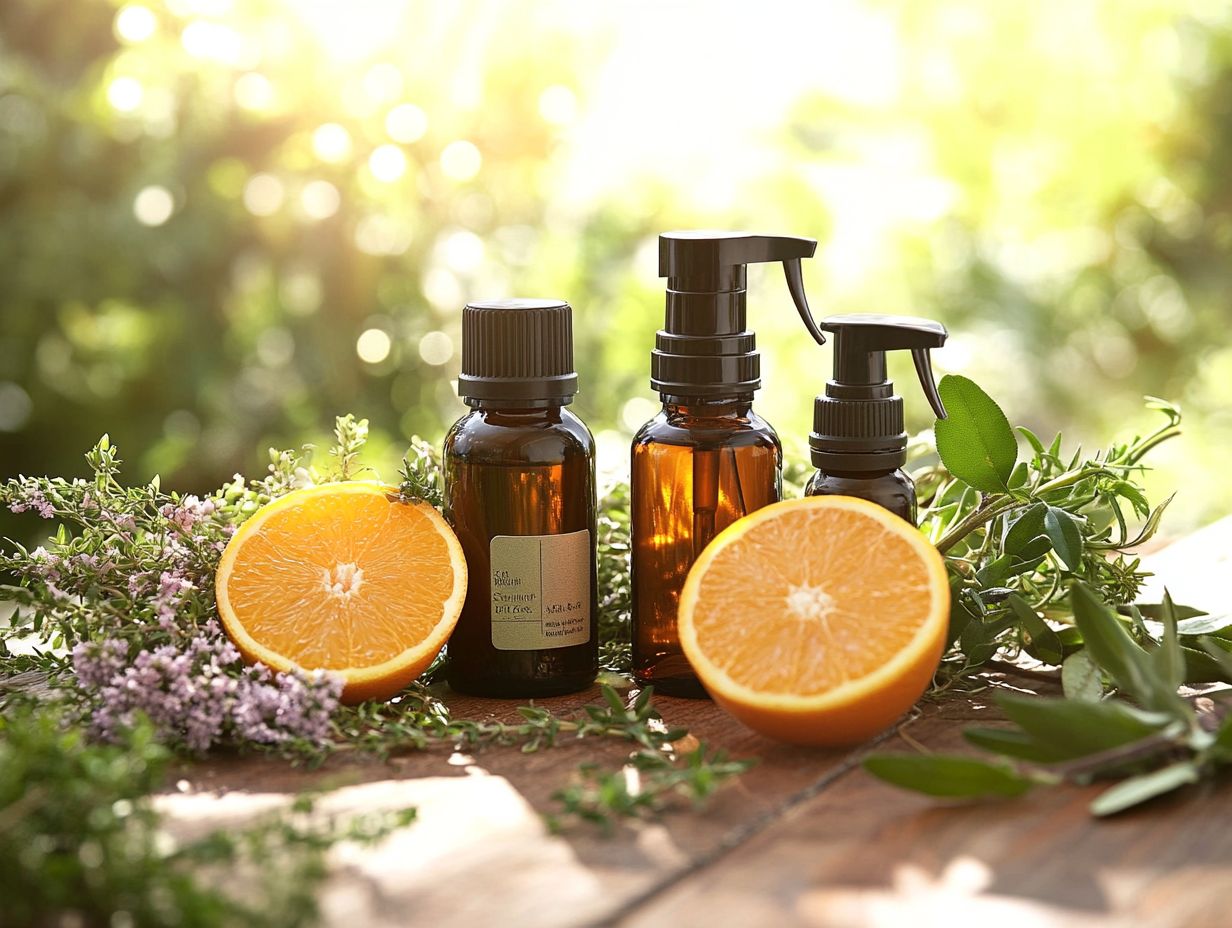
Creating DIY cleaning recipes with essential oils is a delightful and fulfilling way to keep your home spotless while embracing natural ingredients. Picture this: an all-purpose cleaner made with vinegar and a splash of lemon essential oil, a disinfectant spray featuring the purifying properties of tea tree oil, and a soothing linen spray infused with lavender essential oil. These natural cleaning products do more than wipe away dirt they fill your spaces with enchanting fragrances and an aromatic punch.
By tapping into the power of essential oils, you can effortlessly customize your cleaning solutions to meet your specific needs and preferences. For example, when you blend baking soda with peppermint essential oil, you create a remarkable scrubbing paste that tackles stubborn stains while leaving behind a refreshing aroma. You can also consider a mixture of Castile soap a gentle soap made from vegetable oils water, and eucalyptus oil. This combination becomes a formidable bathroom cleaner, effectively battling mold and mildew. These DIY recipes highlight the versatility of essential oil blends in household cleaners.
From your kitchen counters to your bathroom tiles, essential oils offer a versatile array of options for eco-friendly cleaning, ensuring that your home remains fragrant and inviting without relying on harsh chemicals. Whether it’s seasonal cleaning or daily touch-ups, organic essential oils provide natural alternatives to traditional cleaning products.
How Can Essential Oils Be Used in Conjunction with Other Green Cleaning Products?
Essential oils can be a game changer when paired with other green cleaning products, amplifying their cleaning power and enhancing their delightful natural fragrances. By adding just a few drops of essential oils, such as eucalyptus or peppermint, to your existing eco-friendly cleaners, you can tailor your cleaning solutions to your specific preferences while reaping the benefits of their antibacterial properties and antiviral properties.
However, it s important to approach these combinations with care. Begin by testing small amounts of essential oils mixed with your green cleaners to gauge their compatibility and overall scent profile before diving into a larger batch. For instance, mixing lavender essential oil with vinegar or baking soda creates a soothing yet effective cleanser, ideal for surfaces in high-traffic areas. Essential oil combinations can be tailored to different cleaning tasks and preferences, ensuring effective results every time.
Similarly, blending tea tree oil with a natural all-purpose cleaner not only boosts its cleaning prowess but also infuses a fresh, invigorating aroma into your space.
Always remember to ventilate your area while cleaning and to keep your essential oil concoctions out of reach of children and pets.
Are There Any Safety Concerns When Using Essential Oils for Cleaning?
While essential oils present a wealth of benefits for cleaning, it’s vital to keep safety at the forefront of your mind. Understanding essential oil safety is crucial, particularly regarding potential health concerns like allergic reactions or adverse effects from improper use. Comprehensive essential oil research can provide valuable insights into their safe and effective use.
You must ensure that the essential oils you choose are safe for pets and adhere to the proper guidelines for dilution and application to safeguard against any negative reactions. Your diligence in these matters can make all the difference in enjoying the advantages of essential oils while maintaining a safe environment.
Can Essential Oils Be Harmful to Pets?
Certain essential oils can be quite harmful to pets, which is why it s essential for you to select pet-safe options when crafting cleaning products or using them around your home. Oils like tea tree oil and eucalyptus oil can pose serious risks to your cats and dogs if ingested or improperly applied. Always make it a priority to consult with a veterinarian to clearly understand which essential oils are safe for your beloved companions. Pet-safe essential oils ensure that you maintain a safe environment for all household members.
Beyond the commonly recognized dangers, there are also oils like peppermint and citrus that can trigger adverse reactions in pets. Keep an eye out for signs of toxicity, which may manifest as drooling, vomiting, diarrhea, or even lethargy.
To cultivate a pet-friendly environment, consider opting for alternatives like vinegar or baking soda for your cleaning needs both are safe and effective. If you absolutely must use essential oils, diffusing them in a well-ventilated space, away from your furry friends, can help minimize risks while still allowing you to enjoy a delightful aroma. Always keep an eye on your pets for any signs of toxicity or allergy reactions.
What Precautions Should Be Taken When Using Essential Oils for Cleaning?
When incorporating essential oils into your cleaning routine, it’s crucial to take a few precautions to ensure safety and effectiveness. Safety first! Always dilute essential oils before use to avoid skin irritation. If trying a new oil for the first time, consider conducting a patch test. Stay alert for potential allergic reactions and ensure your space is well-ventilated when using concentrated essential oils in your cleaning regimen.
Storing your essential oils in dark glass bottles is vital. This protects them from light exposure and helps maintain their potency over time. Methods such as steam distillation and cold pressing impact the quality of extracted oils. A handy guideline for dilution is a ratio of about 1-2% essential oil to carrier oil or water, which breaks down to around 6-12 drops of oil per ounce of carrier.
Always choose high-quality, pure essential oils sourced from reputable suppliers. This helps avoid fillers or additives that might diminish their effectiveness. While cleaning, keep an eye out for any allergic reactions. Create a safe environment by ensuring the area is well-ventilated. Keep children and pets away from cleaning solutions until everything has dried and is safe to touch. Frequenting a health food store or checking online marketplaces can help you find the best organic products for your needs.
Frequently Asked Questions
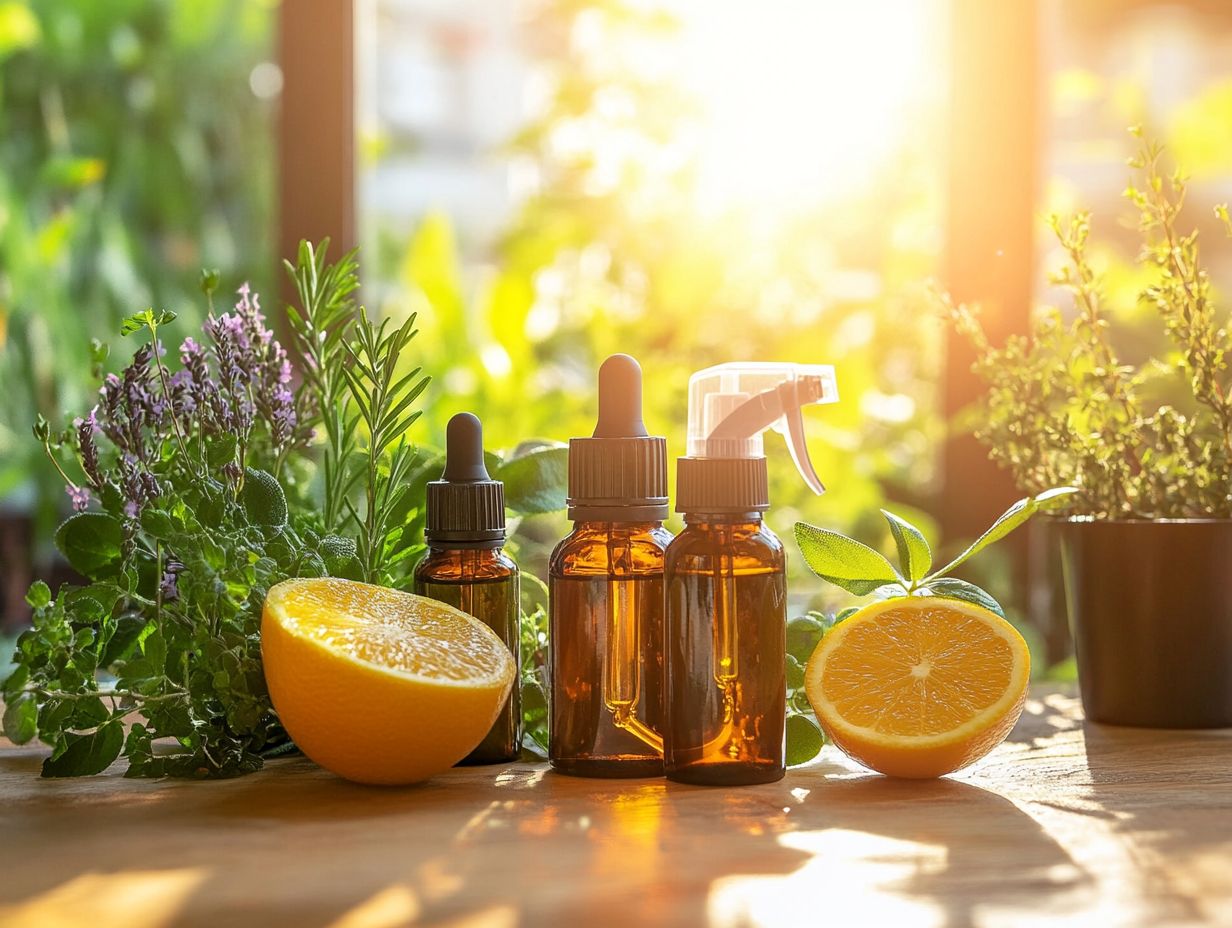
What are essential oils, and why are they great for green cleaning?
Essential oils are natural, aromatic compounds extracted from plants through methods like steam distillation and cold pressing. They serve as an alternative to harsh chemicals, providing a safe and effective way to clean and disinfect surfaces.
Which essential oils are commonly used in green cleaning?
Lemon, tea tree, lavender, peppermint, and eucalyptus are some of the most commonly used essential oils in green cleaning. Each oil has its unique properties and can be used for different purposes. The essential oil market offers a wide range of options, making it easy for enthusiasts to find their preferred blends.
How do essential oils help in making cleaning products eco-friendly?
Essential oils are biodegradable and non-toxic, making them a great alternative to traditional cleaning products that can harm the environment. Derived from renewable resources, they are a sustainable choice for green cleaning. Organic essential oils particularly align well with eco-friendly practices.
Do essential oils have any antibacterial properties?
Yes, some essential oils, like tea tree and eucalyptus, possess natural antibacterial properties. When used in cleaning products, they can effectively kill germs and bacteria without harsh chemicals. These oils are also considered natural disinfectants due to their potent antimicrobial action.
Can essential oils be used to remove stains?
Yes, certain essential oils, such as lemon and orange, have natural stain-fighting properties. They can be used in DIY cleaning solutions to effectively remove stains from surfaces without harsh chemicals. Including these ingredients in your cleaning routine can significantly enhance your home’s cleanliness.
Are there any precautions to take when using essential oils for green cleaning?
Yes, always dilute essential oils properly before use, as they can be too strong in their pure form. It’s advisable to perform a patch test on a small area before using them on larger surfaces to avoid potential allergic reactions. Monitor the ingredient list of your essential oils to ensure you are using pure, unadulterated oils.
Fun Fact: Did you know that adding a few drops of lemon essential oil to your cleaning solution not only helps remove stains but also leaves a fresh scent throughout your home?
In conclusion, essential oils can be a wonderful addition to your cleaning routine, providing both effective cleaning and a pleasant aroma. Try incorporating them today!

